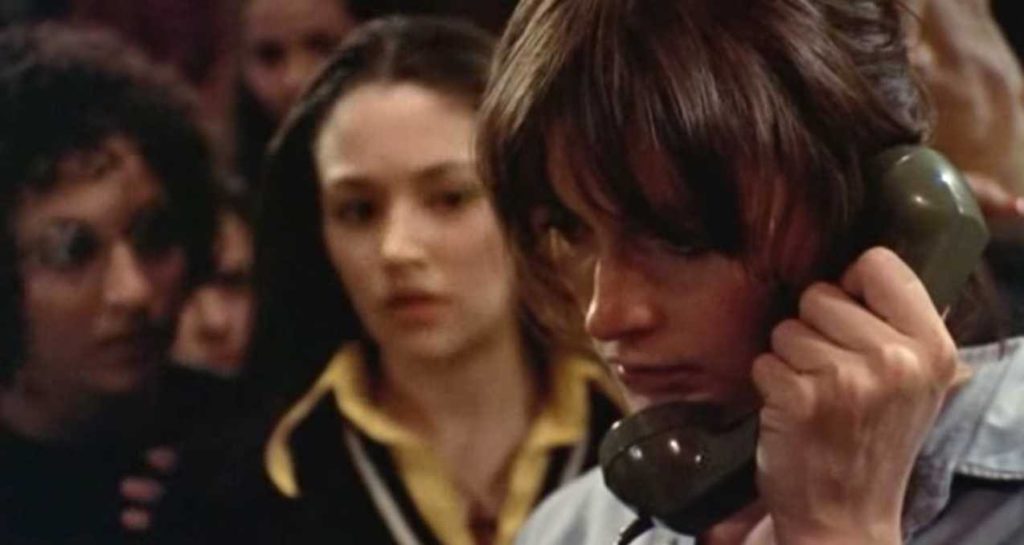Black Christmas (1974)

Although John Carpenter’s 1978 film, Halloween, is widely called by many people the first of the true modern slasher films, many genre enthusiasts point to this little Canadian shocker, released four years earlier, as the one that set the blueprint. Seeing it now, it’s hard to disagree with them, as many of the best elements in Halloween (holiday setting, unseen killer, female victims/female protagonists, first-person perspective, killer in the house, heavy breathing, disturbing phone calls, claustrophobic atmosphere, and ambiguous endings) seem to be taken directly from this film. Coincidence? Perhaps. Although it is interesting to note that there is a legend (perhaps an urban one) director Bob Clark (Porky’s, Baby Geniuses) claimed to have developed an idea for a sequel similar to this film set on Halloween that he passed on to Carpenter, which became the impetus for Halloween itself.
Controversial though it may be, I actually consider Black Christmas to be a superior film than Halloween, regardless of whichever film people claim to be the one that sparked the slasher film explosion in the later 1970s and early 1980s. The humor is livelier, the characters more interesting, and despite both films shot on fairly low budgets, this Canadian production seems to have gained the most mileage out of its meager resources.
The story involves a sorority house that is being harassed by an obscene phone caller who goes from disturbing sexual comments to threats of violence. Soon, it appears that he has entered the sorority house, starting to make good on his promise to kill them. He continues to make phone calls from within the house, and as others are found to have gone missing, the remaining girls contact the authorities to assist in catching the perpetrator before he comes after them.
Almost a decade before director Bob Clark would make what many younger people consider to be their favorite Christmas film of all time, A Christmas Story, he made one of the most anti-Christmas films ever with Black Christmas. It not only went against the grain in terms of the Christmas spirit, it also openly defied many religious conventions, with its language, dark humor, violence, and amoral (or perhaps immoral) stance that flaunted its teenage cast’s sexuality, hedonism, and defiance of authority (it even tackles abortion). By today’s standards, this is all very par for the course, which goes to show just how influential Clark’s film would come to be.
Perhaps the most surprising aspect of Black Christmas is that it would not only be one of the first films in its soon-to-flourish genre, but that it still remains, to this day, one of the best. Perhaps not until Scream, which openly satirizes the very things one can find readily in Black Christmas, has there been a funnier, more clever, and more effective example of the genre. Others have closely followed the “killer in the house”/”he knows you’re alone” formula, but rarely has it been as intense as when Hussey (Romeo and Juliet, Death on the Nile) begins to question whether she might very well be in the house with a sadistic, depraved lunatic.
I freely admit that I’m not a fan of slasher films, and I am among the minority of critics that don’t revere Halloween for revolutionizing the way horror films are presented (if you believe that it simultaneously rips off Psycho and Black Christmas, how can you still claim it is revolutionary?). Nevertheless, I find that Black Christmas is a superior example of these sorts of films, and the fact that it would become the pattern for many future shock horror flicks to follow only makes it that much more impressive. If you’ve seen Halloween or any of the many films that essentially follow the same formula, you’d do well to seek this little gem out. Despite nearly every facet of the film becoming convention, It still holds up quite well today.
— Remade in 2006.
Qwipster’s rating: A-
MPAA Rated: R for violence, disturbing images, sexual references, and language
Running Time: 98 min.
Cast: Olivia Hussey, John Saxon, Keir Dullea, Margot Kidder, Marian Waldman, Andrea Martin, James Edmong, Douglas McGrath, Art Hindle, Lynne Griffin
Director: Bob Clark
Screenplay: Roy Moore
